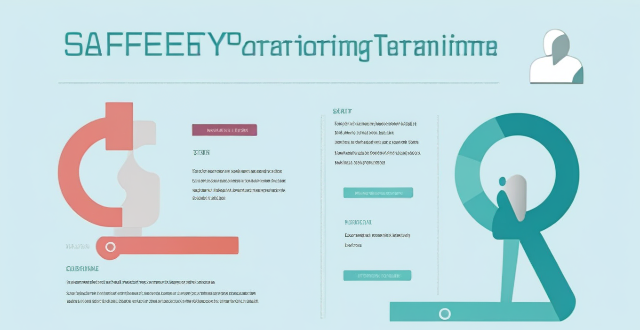Job Legislation

What are the economic implications of enacting stringent climate change legislation ?
The article discusses the economic implications of stringent climate change legislation, which include job creation in renewable energy and green infrastructure sectors, potential increases in energy and food prices, new business opportunities in innovation and carbon trading, and investment in clean technology leading to economic growth. However, there are also short-term transition costs and job displacement issues. Despite these challenges, the long-term benefits such as improved air quality and increased resilience against natural disasters make the implementation of such legislation beneficial for future generations.

Can environmental legislation effectively reduce pollution ?
Environmental legislation has the potential to effectively reduce pollution, but its success depends on various factors such as enforcement and compliance, public awareness and participation, technological innovation, political will, international cooperation, and economic considerations. Strong regulatory bodies, education campaigns, investment in clean technology, government prioritization of environmental protection, global collaboration, and balancing environmental goals with economic development are all crucial for the effectiveness of environmental legislation. Achieving lasting improvements in environmental quality requires ongoing effort from all sectors of society.

How has environmental legislation evolved over time ?
Environmental legislation has evolved over time, reflecting growing awareness of environmental issues. Early stages focused on preserving natural resources and conserving wildlife habitats, while post-World War II saw a shift towards pollution control through air and water quality regulations. The late 20th century introduced comprehensive environmental protection laws addressing multiple aspects of environmental degradation. Today's legislation prioritizes sustainable development and climate change mitigation, with a focus on public participation and transparency in decision-making processes.

What challenges have been faced in the adoption and enforcement of climate change legislation ?
Climate change is a global issue that requires immediate attention and action. The adoption and enforcement of climate change legislation are crucial steps in mitigating the effects of climate change. However, several challenges have been faced in this process, including: 1. Lack of Political Will: Governments often prioritize short-term economic gains over long-term environmental sustainability, making it difficult to pass and implement effective climate policies. 2. Economic Barriers: The high cost associated with transitioning to clean energy sources can be a significant barrier to adopting and enforcing climate change legislation. Additionally, the shift towards clean energy can lead to job losses in traditional industries such as fossil fuel extraction and manufacturing. 3. Legal and Institutional Hurdles: Many countries lack comprehensive legal frameworks for addressing climate change, which can hinder the adoption and enforcement of effective climate policies. Weak enforcement mechanisms can also undermine the effectiveness of climate change legislation. 4. Public Awareness and Participation: Public awareness and understanding of climate change issues are essential for the successful adoption and enforcement of climate change legislation. However, many people still lack a basic understanding of the science behind climate change and its potential consequences. Active public participation is crucial for driving change and holding governments accountable for their actions on climate change. Addressing these challenges requires a concerted effort from governments, civil society organizations, businesses, and individuals worldwide. Only by working together can we hope to mitigate the effects of climate change and secure a sustainable future for all.

How does environmental legislation differ across countries ?
Environmental legislation varies across countries due to differences in economic development, political systems, cultural values, and environmental priorities. The legal framework for environmental protection ranges from comprehensive laws covering various issues to piecemeal legislation addressing specific problems. Enforcement mechanisms also differ, with some countries having strong regulatory bodies and others lacking institutional capacity or political will. Penalties and sanctions for non-compliance vary widely, as do opportunities for public participation in decision-making processes. International cooperation is crucial but varies in commitment and action among countries. Overall, these differences highlight the need for greater coordination and cooperation to address global environmental challenges effectively.

How does climate change legislation influence corporate sustainability practices ?
Climate change legislation significantly influences corporate sustainability practices by setting standards for environmental responsibility. It compels companies to report on their environmental impact, use market-based mechanisms like cap-and-trade systems, and consider tax incentives or penalties in their operations. This legislation also creates investor pressure through ESG criteria and shareholder resolutions, leading companies to enhance their sustainability practices to meet investor expectations. Additionally, it opens market opportunities for green products and services and encourages renewable energy adoption. Companies that comply with climate legislation can improve their brand image and stakeholder engagement. Furthermore, such legislation aids in risk management by requiring companies to assess physical and transition risks associated with climate change. Overall, climate change legislation is a driving force behind corporations adopting more sustainable practices.

How does automation affect job security ?
Automation affects job security by increasing efficiency, causing job displacement, creating a skill gap, and generating new job opportunities. To mitigate its effects, individuals should continuously learn and adapt, while organizations should offer reskilling programs and implement progressive policies.

What role do citizens play in shaping environmental legislation ?
The text discusses the significant role that citizens play in shaping environmental legislation. It outlines various ways in which they can influence such legislation, including advocacy and public awareness, voting and elections, lobbying and policy influence, litigation and legal action, and grassroots movements and direct action. The text emphasizes that by working together, citizens can help create a more sustainable future for themselves and future generations.

How effective has the recent climate change legislation been in reducing greenhouse gas emissions ?
The effectiveness of recent climate change legislation in reducing greenhouse gas emissions has been variable, with some regions and policies showing significant success while others face numerous barriers.

How has social distancing impacted the economy and job market ?
Social distancing measures have had a significant impact on the economy and job market, including decreased consumer spending, supply chain disruptions, high unemployment rates, increased demand for remote work, and changes in job seeking behavior.

How will AI impact the job market in the future ?
The impact of AI on the job market is multifaceted. While it brings opportunities for increased efficiency and novel professions, it also presents challenges related to job displacement, skill shifts, inequality, and the need for adaptive policies. The future of work in an AI-driven world will require a collaborative effort from individuals, businesses, and governments to navigate these changes effectively.

How will climate change influence future job markets ?
The article discusses how climate change will influence future job markets. It highlights the increased demand for green jobs, a shift toward resilient industries, and potential declines in certain sectors that contribute to greenhouse gas emissions or rely heavily on fossil fuels. Additionally, remote work opportunities may rise due to extreme weather events and environmental concerns. The article concludes by emphasizing the need for individuals and organizations to adapt to these changes in the job market.

How does climate change influence job security in coastal regions ?
Climate change significantly impacts job security in coastal regions through direct effects such as sea level rise, increased storm intensity, and changes in ocean temperatures. These environmental changes directly affect industries like fishing, tourism, agriculture, and infrastructure, leading to job losses or reduced hours for employees. Indirectly, climate change can cause economic displacement, public health concerns, and policy changes that create new job opportunities while potentially reducing jobs in other sectors. Addressing these challenges requires coordinated efforts from various stakeholders to adapt to changing conditions and transition towards more resilient economic systems.

What are the consequences of not having adequate environmental legislation ?
The text discusses the importance of adequate environmental legislation and its absence's consequences. It outlines the impact on environmental degradation, human health, economic stability, and social welfare. The introduction emphasizes the need for such laws for sustainable development and planet protection. Four main points are discussed: 1. Environmental Degradation includes loss of biodiversity, pollution, deforestation, and ocean acidification. 2. Human Health Impacts cover respiratory problems, waterborne diseases, and food safety concerns. 3. Economic Implications involve resource depletion, job losses, and tourism decline. 4. Social Welfare Issues include inequality, displacement, and conflict over resources. The conclusion stresses the urgency for governments worldwide to implement and enforce strong environmental laws for a sustainable future.

How does private equity impact job creation and retention ?
Private equity (PE) has a significant impact on job creation and retention, primarily through investing in underperforming companies, supporting startups and small businesses, and engaging in strategic acquisitions and mergers. PE firms also contribute to job retention by providing stable funding, investing in employee training programs, and participating in succession planning. While some argue that PE prioritizes short-term profits over long-term job growth, others contend that PE plays a crucial role in promoting economic stability and workforce development.

How might a lunar base influence the global economy and job market ?
The establishment of a lunar base could significantly impact the global economy and job market by increasing investment in space technology, creating new industries, driving innovation, and fostering international collaboration. It could also create numerous job opportunities and expand educational opportunities focused on space-related disciplines.

What impact does climate change legislation have on renewable energy development ?
Climate change legislation significantly influences renewable energy development by providing financial incentives, establishing mandated targets, supporting research and infrastructure, creating consumer awareness, fostering international cooperation, implementing regulations, setting environmental standards, and promoting economic growth through job creation. These measures collectively drive the energy sector towards sustainability and a low-carbon future.

What are the key provisions of the latest climate change legislation ?
The latest climate change legislation is a comprehensive package of measures aimed at addressing the challenges posed by global warming and climate change. The key provisions include reduction of greenhouse gas emissions, adaptation to climate change impacts, international cooperation and leadership, just transition for workers and communities, and transparency and accountability.

What are the job prospects for fitness instructors ?
The fitness industry is experiencing steady growth, driven byThe fitness industry is experiencing steady growth, driven by of regular exercise, rise in This growth has led to a rise in job opportunities for fitness instructors across various settings such as gyms, corporate wellness programs, community centers, and online platforms. Fitness instructors can also expect career growth through specialization, certification, management, or entrepreneurship. Overall, the job prospects for fitness instructors are promising with numerous opportunities for career advancement.

How do climate goals affect the economy and job market ?
Climate goals, aiming to reduce greenhouse gas emissions and promote renewable energy sources, significantly impact the economy and job market. The growth of the renewable energy sector creates new business opportunities and jobs, while carbon pricing mechanisms incentivize companies to invest in cleaner technologies. Green infrastructure investments stimulate economic growth by creating jobs and improving public health. However, achieving climate goals can also displace workers in fossil fuel-dependent industries, necessitating support and training programs for transitioning into new roles within the green economy. Education and training focused on sustainability and renewable energy are crucial to meet the demands of the changing job market. Overall, prioritizing climate goals presents challenges but also offers numerous opportunities for economic growth and job creation in industries related to sustainability practices.

How do exercise programs impact employee productivity and job satisfaction ?
Exercise programs have a significant impact on employee productivity and job satisfaction. Companies can improve employee health, reduce stress levels, enhance team building, increase energy levels, improve mental clarity and cognitive function, reduce absenteeism and tardiness, enhance work-life balance, increase motivation and engagement, and improve company culture and retention rates by promoting a healthy lifestyle and providing opportunities for physical activity. Implementing exercise programs should be considered a valuable investment for any organization looking to improve its overall performance and success.

How can we prepare for the changing job landscape in the future ?
The future job landscape is constantly evolving, and it's important to stay ahead of the curve. Here are some ways to prepare for the changing job landscape: 1. **Continuous Learning**: Upskill or reskill to remain relevant in the job market, take advantage of online courses, and attend workshops and seminars related to your field. 2. **Adaptability**: Embrace change, be open to new ideas, and be flexible in your job search. 3. **Networking**: Build professional relationships, attend events, join professional organizations, and connect with people on platforms like LinkedIn. Conduct informational interviews with professionals in your field. 4. **Technology Proficiency**: Stay tech-savvy and familiarize yourself with popular tools and software used in your industry. Consider learning basic coding skills. 5. **Personal Branding**: Establish an online presence through platforms like LinkedIn, Twitter, and personal websites. Showcase your expertise by publishing articles and participating in discussions. By focusing on these areas, you can position yourself for success in the ever-evolving job market.

How does a sedentary lifestyle affect job productivity and overall health ?
This article discusses the negative impacts of a sedentary lifestyle on job productivity and overall health. It outlines how prolonged periods of sitting can lead to decreased energy levels, impaired cognitive function, and increased stress and anxiety in the workplace. It also highlights the increased risk of chronic diseases such as heart disease, diabetes, and obesity, as well as musculoskeletal issues and poor mental health associated with a sedentary lifestyle. The article concludes by emphasizing the importance of incorporating regular physical activity into daily routines and maintaining a healthy work-life balance to improve job performance and overall well-being.

How does Fintech influence the job market in the finance industry ?
The influence of fintech on the job market in the finance industry has led to the creation of new roles and changes in the skillset required for existing positions. Fintech companies have increased demand for software developers, data scientists, and cybersecurity experts. Additionally, specialized financial roles like fintech startup founders, regulatory compliance officers, and customer experience managers have emerged. Traditional finance roles such as bankers, accountants, and investment advisors now require proficiency in digital tools and an understanding of automation and data analytics. As technology continues to advance, the finance industry workforce will need to adapt continuously to stay relevant in the changing job market.

How can we ensure job security in an ever-changing employment landscape ?
In the ever-changing employment landscape, job security is a concern for many professionals. To maintain job security, strategies such as continuous learning, adaptability, networking, performance orientation, personal branding, career planning, financial planning, and mental health management are recommended. These approaches can help professionals stay relevant, demonstrate value, build a positive image, set clear goals, save for emergencies, manage stress, and seek support when needed. By implementing these strategies, individuals can increase their resilience and adaptability, enhancing their job security.

How can personal safety training be tailored to different risk levels and job roles within an organization ?
Personal safety training is crucial for protecting employees. Tailoring this training to different risk levels and job roles ensures that each employee receives the specific knowledge and skills needed for their work environment. This involves identifying risk levels, defining job roles, developing tailored training programs, incorporating practical exercises, and continuously updating and evaluating the training's effectiveness.

What are the challenges in implementing environmental legislation ?
The text discusses the challenges in implementing environmental legislation, including lack of awareness and education, insufficient funding and resources, political will and support, legal and administrative hurdles, technological limitations, and international cooperation and coordination. Addressing these challenges requires a multi-faceted approach involving education, advocacy, policy reform, and collaboration at all levels of society.

How can we ensure compliance with environmental legislation ?
Ensuring compliance with environmental legislation is crucial for protecting the planet and its inhabitants, and can be achieved through education and training of stakeholders, developing and implementing policies, monitoring and reporting performance, and collaborating with stakeholders.

How does climate legislation vary across different countries ?
Climate legislation varies across countries due to factors such as government involvement, emphasis on different sectors, stringency of emission targets, and international cooperation. Some countries focus on reducing emissions from transportation or energy production, while others prioritize agriculture or waste management. The level of government involvement also differs, with some countries relying more on local or regional authorities. Additionally, the stringency of emission targets set by different countries varies widely. International cooperation and compliance with global climate agreements also play a role in shaping climate legislation across countries.

What is the impact of environmental legislation on businesses ?
This article discusses the impact of environmental legislation on businesses, including cost implications, reputation and brand image, innovation and competitive advantage, and legal risks and liability. It highlights the need for businesses to comply with these laws and regulations to avoid negative consequences and position themselves as leaders in sustainability and innovation.